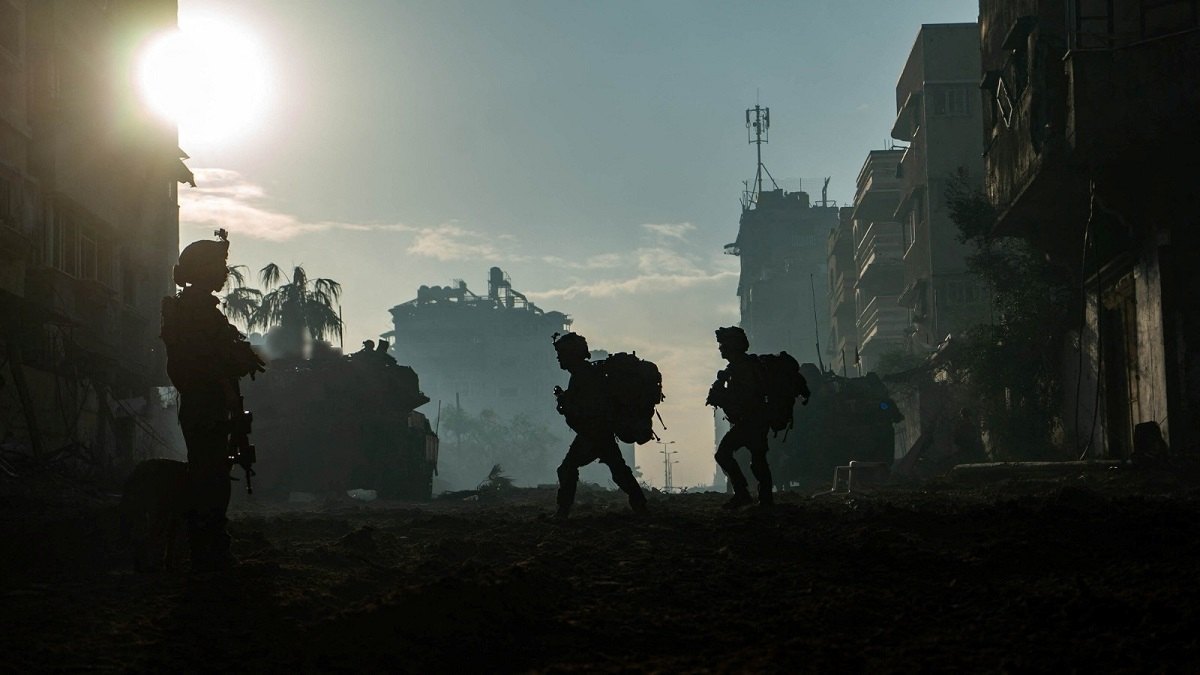
Israeli troops operate in the Gaza Strip, amid the ongoing ground operation of the Israeli army against the Palestinian Islamist group Hamas, in this handout image released November 19, 2023.
10:48 JST, November 21, 2023
Earlier this month, the New Yorker published a first-person account from the besieged Gaza Strip by Mosab Abu Toha, a rising young Palestinian poet who had recently returned home after completing graduate studies in the United States.
“I sit in my temporary house in the Jabalia camp, waiting for a ceasefire,” he wrote. “I feel like I am in a cage. I’m being killed every day with my people. The only two things I can do are panic and breathe. There is no hope here.”
Now, two weeks later, Abu Toha has reportedly been detained by Israeli forces, according to colleagues.
Diana Buttu, a lawyer and Palestinian activist who has been in touch with Abu Toha’s wife, told The Washington Post on Monday that he was attempting to evacuate to southern Gaza with his family when he was arrested by the Israeli military at a checkpoint, along with about 200 other people.
An Israel Defense Forces spokesperson told The Post that they were looking into the matter.
“It’s very scary,” said writer Laura Albast, another friend and colleague of Abu Toha. “We don’t know where he is.”
The New Yorker put out a statement in its daily newsletter calling for the writer’s safe return and highlighting some of his recent writing for the magazine. Earlier on Monday, the magazine’s web editor, Michael Luo, wrote on social media that top editor David Remnick sent a note to staff about the “worrisome news,” saying they “learned he was arrested in central Gaza.” The New Yorker did not respond to requests for comment.
The magazine’s response struck some of Abu Toha’s colleagues, including Albast, as tepid. She said the magazine was happy to “diversify their portfolio” with the writings of a Gazan, but didn’t name who had arrested him.
On Monday, the New Yorker published a short statement that said “Israeli forces reportedly detain a New Yorker contributor.”
“One idea in particular haunts me, and I cannot push it away,” Abu Toha wrote in the magazine last month. “Will I, too, become a statistic on the news?”
Abu Toha, who is in his early 30s, has published in a number of journals, including Poetry magazine, Arrowsmith and the Nation, which on Thursday published his latest poem, “Gazan Family Letters, 2092.” He also wrote an essay for the New York Times last month. After a fellowship as a visiting poet at Harvard, he completed a graduate degree earlier this year at Syracuse University, where he was also a teaching assistant.
This year, he was named a finalist for the National Book Critics Circle’s poetry award, for his 2022 collection, “Things You May Find Hidden in My Ear: Poems from Gaza.”
Abu Toha also founded the Edward Said Public Library in Gaza, the only English-language library in the enclave.
Buttu said that Abu Toha had been in touch with the U.S. government in recent weeks to gain approval to evacuate his family from Gaza. The youngest of his three children, 3-year-old Mostafa, was born in the United States and is a U.S. citizen.
PEN America, the literary and human rights advocacy organization, wrote in a statement that it is “concerned by reports that poet Mosab Abu Toha, the founder of Gaza’s only English language library, has been taken into custody by Israel’s Defense Forces in Gaza. We are seeking more details and call for his protection.”
Washington-based writer Jehad Abusalim has known Abu Toha for years, and the two worked together on an anthology “Light in Gaza: Writings Born of Fire,” which was published last year. Abusalim said he learned of Abu Toha’s arrest Monday morning from social media.
“His poetry and writing capture the persistence of life in the face of many odds – occupation and recurring aggression,” Abusalim said in a phone interview. “Mosab represents life for us.”
“Of course one doesn’t have to be a renowned poet for their life to matter,” Abusalim continued. “But I think, for us, because we’ve known Mosab, we’ve read his words, there’s this element of familiarity.”
On Monday, New Yorker editor Daniel Gross shared Abu Toha’s poem “Obit,” which the magazine published earlier this month.
“I keep thinking about this poem,” he said, adding: “We are waiting for his return.”
Top Articles in News Services
-

Survey Shows False Election Info Perceived as True
-

Hong Kong Ex-Publisher Jimmy Lai’s Sentence Raises International Outcry as China Defends It
-

Japan’s Nikkei Stock Average Touches 58,000 as Yen, Jgbs Rally on Election Fallout (UPDATE 1)
-

Japan’s Nikkei Stock Average Falls as US-Iran Tensions Unsettle Investors (UPDATE 1)
-

Trump Names Former Federal Reserve Governor Warsh as the Next Fed Chair, Replacing Powell
JN ACCESS RANKING
-

Producer Behind Pop Group XG Arrested for Cocaine Possession
-

Japan PM Takaichi’s Cabinet Resigns en Masse
-

Man Infected with Measles Reportedly Dined at Restaurant in Tokyo Station
-

Israeli Ambassador to Japan Speaks about Japan’s Role in the Reconstruction of Gaza
-

Videos Plagiarized, Reposted with False Subtitles Claiming ‘Ryukyu Belongs to China’; Anti-China False Information Also Posted in Japan

























